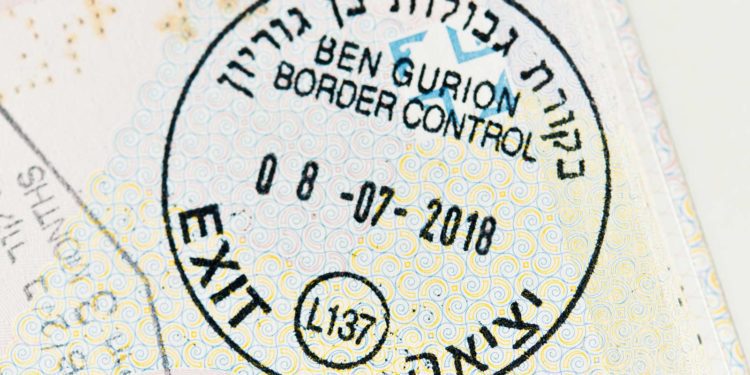Operating to Israel – Part 2: Flight and Operating Restrictions

This business aviation blog post continues from our article last week, titled “Operating to Israel – Part 1: Airports & Local Area.”
In this part of the world operators need to be mindful of restrictions impacting operations to/from Israel and the rest of the region. While these restrictions can be significant, there are ways to mitigate many of the operating challenges.
The following is an overview of what you need to know:
1. Operating and flight restrictions
Israel does not permit international tech stops and prohibits overflight of its territory, with exception of Royal Jordanian flights to/from Amman – Marka (OJAM) and Queen Alia Intl (OJAI). Be mindful that if you depart Israel there are many countries in the region that will not permit you to enter their airspace. This includes all of North Africa with the exception of Egypt, and all the Arabian Peninsula with the exception of Jordan. Sudan and Lebanon also do not permit use of their airspace if you’re flying to/from Israel. While Egypt allows certain flights to/from Israel to transit its airspace, special permission is needed and lead time for this is five business days. Regional restrictions make it difficult to fly directly from Israel to many regions, other than Europe, Russia and North America. The way to mitigate these operating restrictions is to plan a flight leg to OJAI to OJAM or Larnaca (LCLK) and then continue on to the ultimate destination. However, be advised that if you’re operating an Israeli built or registered aircraft, overflight will still be prohibited even if you stop at OJAI.
2. Departures to Israel
GA operators may only fly directly to Israel from a list of approved international airfields. Shannon (EINN), Farnborough (EGLF), Le Bourget (LFPB) and Nice (LFMN) are on the list as well as several airports in the countries of Spain, Italy and France. Three airports in the U.S. are qualified for direct operations — Newark (KEWR), New York (KJFK) and Philadelphia (KPHL) — and one airport in Canada, Toronto (CYYZ), is available. While it’s possible to fly to Israel from a non-listed airport such as Teterboro (KTEB), this can be a complicated and time consuming procedure. For such approval passengers and crew need to go to an Israeli embassy or consulate for a special security interview/approval. For the full list of airports, it’s recommended that you speak to your 3rd-party provider to ensure you have the latest information.
3. Visas and documentation
To enter Israel passports must have remaining validity of at least six months. Certain nationalities are visa exempt for Israel. U.S. citizens and EU nationals may enter the country visa-free for up to 90 days. Crew listed on the gen dec, in most cases regardless of nationality, may enter Israel without a visa for up to 30 days. Per Israeli law, any dual national with an Israel passport must always enter/leave Israel using the Israeli passport. On the other hand, you must not use an Israeli passport to enter other countries in this region. For example, the UAE will deny you entry even if they ‘think’ you may be an Israeli national who’s traveling on a different passport. Additionally, when entering Israel, passengers and crew need to ensure that Israeli immigration does not stamp their passports. Such stamps will invalidate the passport for subsequent entry to other countries in the region.
4. Security considerations
While both Tel Aviv (LLBG) and Eilat (LLET) are highly secure airports it’s possible to arrange supplemental aircraft security at both locations. Arrangements are coordinated via local airport police and armed security options are possible. However, most operators do not feel the need for additional security arrangements. Obtaining pre-trip security briefs, particularly for operators not familiar with this region, is recommended.
5. Hotels and in-flight catering
Good international chain hotels are available in Tel Aviv and seldom sell out. Expect to pay 235-325 USD for 4-star crew accommodations either in downtown Tel Aviv or on the waterfront, about eight miles from LLBG. In-flight caterers are available at LLBG and most operators chose this option. Your ground handler will coordinate off airport catering, and crews may also self-cater from area hotels/restaurants, if this is preferred.
6. Fuel and credit
Fixed base operators (FBOs) and ground handlers in Israel will help coordinate fuel uplifts and this can be accomplished 24 hours a day at LLBG. For GA ops to Israel it’s recommended to provide two days prior notice for fuel uplifts and to always carry a fuel release. Certain aviation cards may be accepted for credit but not all are. Fuel costs in Israel are reasonable and contract fueling can be set up.
7. Additional Reading: Israel operations
Note: Links will be updated as articles are published.
- Part 1 – Airports and local area
- Part 2 – Flight and operating restrictions
- Part 3 – Permits and operating procedures
Conclusion
If you’re operating an Israeli built or registered aircraft or have passengers/crew onboard who are nationals of Israel, care must be taken in order to operate compliantly within the region. However, many operating challenges can be addressed with sufficient lead time and when working with experienced 3rd-party providers.
Stay tuned for Part 3, which covers permits and operating procedures when traveling to Israel.
Questions?
If you have any questions about this article or would like assistance planning your next trip to Israel, contact me at jeffkelley@univ-wea.com.



